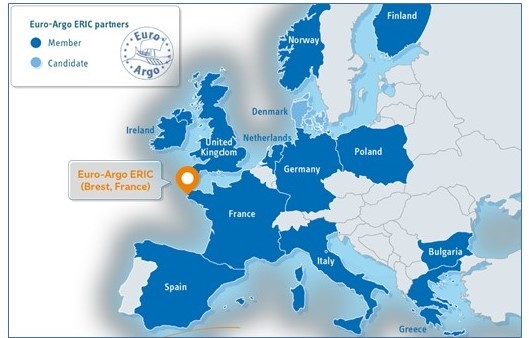
On June 8th, Poland became a permanent member of the Global Ocean Observing System Euro-Argo ERIC. This is a significant step in Poland's involvement in the international program for monitoring seas and oceans using Argo floats. It was made possible through the efforts of Polish oceanographers and the support of the Ministry of Education and Science.
262.jpg)
Fig. 1. On June 8th, 2023, Trieste. The ceremony of Poland joining Euro-Argo ERIC as a permanent member. From left: Agnieszka Beszczynska-Moeller (oceanographer from IOPAN), Yann-Hervé De Roeck (Euro-Argo ERIC Program Manager), Marta Stawicka (Ministry of Education and Science - Poland), and Jean-Marie Flaud, Chair of the Euro-Argo ERIC Council (French Ministry of Higher Education and Research). Source: © Euro-Argo ERIC, euro-argo.eu
Argo is a global ocean observation system. It uses a network of 4,000 autonomous profiling floats that measure temperature, salinity, and other properties of seawater from the surface to a depth of 2,000 meters (Fig. 2). The collected data is transmitted via satellite to data centers. The real-time data is immediately used by meteorological and oceanographic services and for scientific analysis.
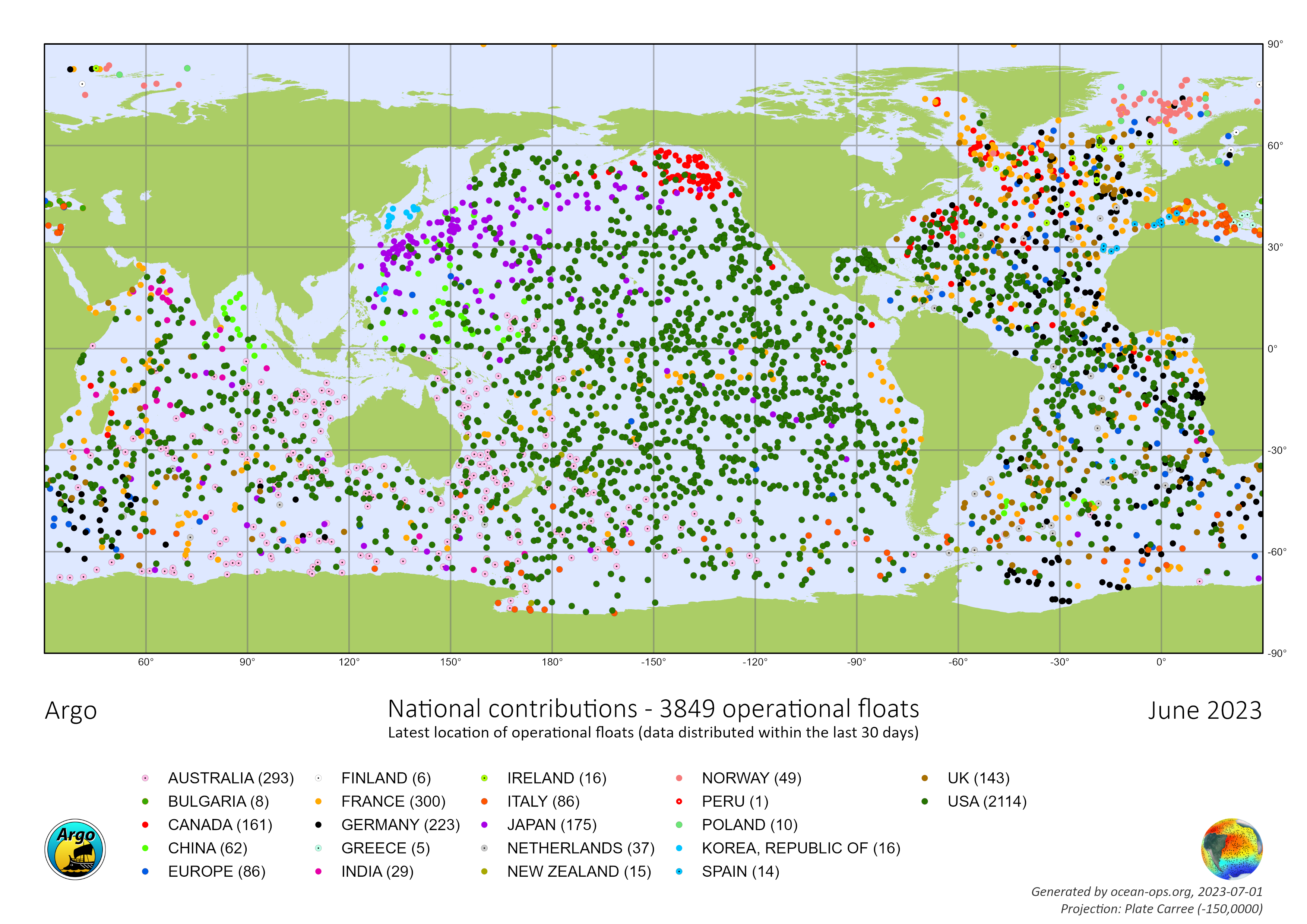
Fig. 2. Global Argo float network in June 2023. Source: https://www.ocean-ops.org/board?t=argo
Poland has been participating in the international Argo program and the European research infrastructure project Euro-Argo since 2008. Euro-Argo aims to contribute the European effort to the global network by deploying and maintaining 1/4 of the Argo float fleet. The Institute of Oceanology Polish Academy of Sciences (IOPAN) represents Poland in the Argo organizations, with prof. Waldemar Walczowski leading the Argo-Poland activities.
Since 2011, IOPAN has been involved in shaping the European Research Infrastructure Consorcium Euro-Argo ERIC. The European Research Infrastructure Consortium (ERIC) is a specific legal form that facilitates the establishment and operation of research infrastructures of European significance. In 2014, Poland was one of the founding members of Euro-Argo ERIC, initially joining as an observer. In 2021, the Argo-Poland Consortium was established, consisting of the Institute of Oceanology Polish Academy of Sciences in Sopot (the consortium leader), the Institute of Geophysics Polish Academy of Sciences in Warsaw, and the Polish Naval Academy in Gdynia. In 2022, the consortium received funding from the Ministry of Education and Science (agreement No. 2022-WK-04). The program includes regular procurement and deployment of floats in the Arctic and the Baltic Sea, monitoring key oceanic parameters such as temperature, salinity, and dissolved oxygen levels, and providing data to scientific researchers worldwide. As a member of Euro-Argo, IOPAN collaborates with other institutions and scientific programs, sharing results and experience in oceanographic research. The consortium aims to develop new methods and technologies that contribute to a better understanding of changes occurring in the oceans and their impact on the environment.
Argo Technology
Argo floats are autonomous devices that measure basic properties of seawater. These devices do not have their own propulsion and are carried by ocean currents in the horizontal plane. However, they can move vertically by changing the volume of an external bladder filled with oil. Drawing oil into the rigid hull causes loss of buoyancy and gradual sinking of the float, while pumping oil into the bladder causes it to rise and float to the surface (Fig. 3). In the open ocean, profiling to a depth of 2,000 meters occurs every 10 days, and the collected environmental data is transmitted via satellite. The real-time data is available in less than 24 hours and used for meteorological and oceanographic forecasts. Argo is the only global system that provides operational oceanographic data in near-real time. The data, after further validation and processing, is also used for scientific analysis. Technological advancements have made Argo floats highly efficient and relatively inexpensive, with a float's operational lifespan reaching up to 5 years on the open ocean. In addition to the standard temperature and salinity measuring floats (Core Argo), more deep-sea floats (Deep Argo, measuring to 6,000 meters) and Biogeochemical floats (BGC) equipped with additional sensors to measure temperature, salinity, dissolved oxygen, light field, nutrient content, chlorophyll, suspended matter, pH, and other properties of seawater are being developed.
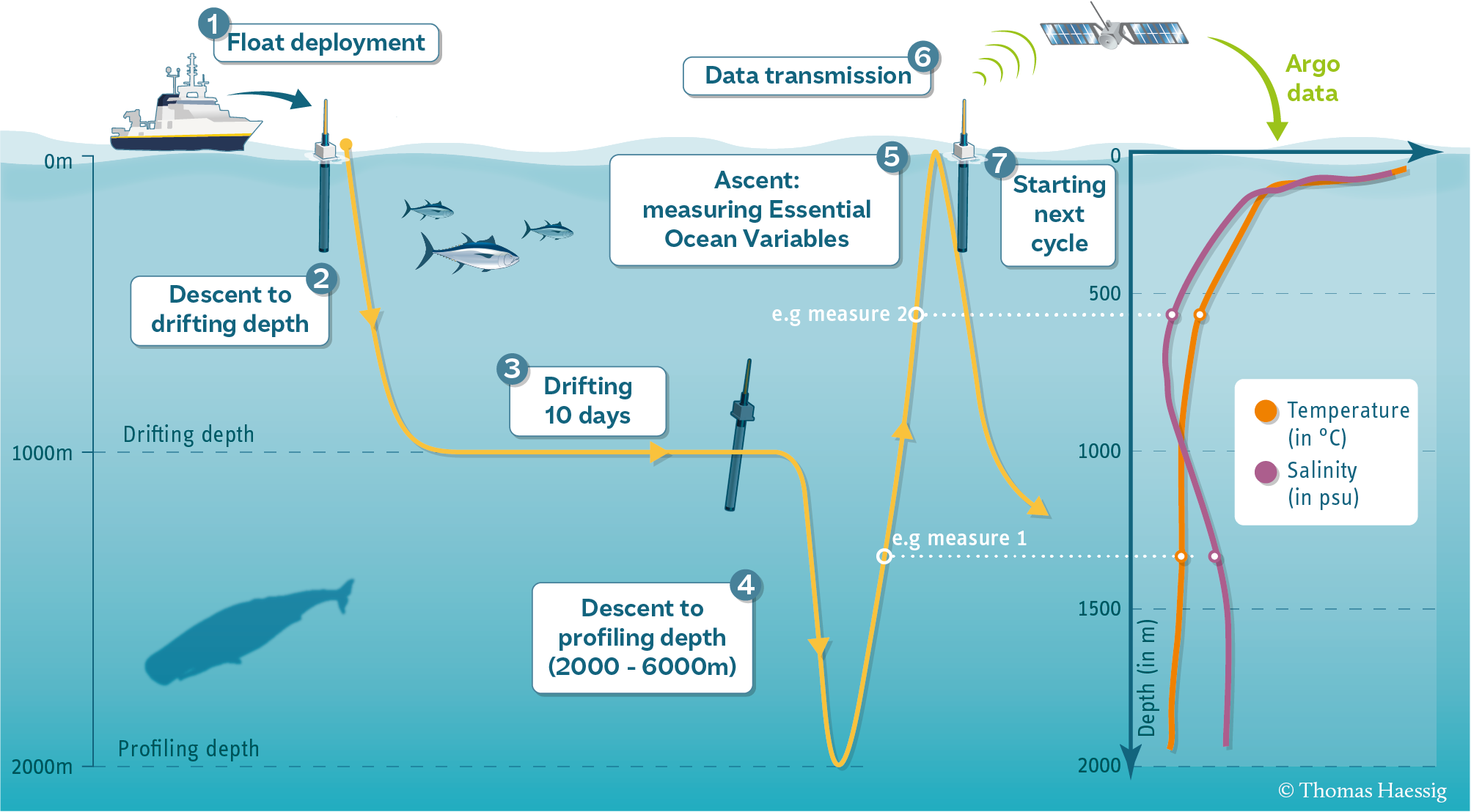
Fig. 3. Argo float cycle: (1) deployment, (2) descent to the drifting depth, (3) drift, (4) descent to the profiling depth, (5) ascent and measurement of Basic Ocean Variables, (6) data transmission, (7) start of a new cycle. Source: argo.ucsd.edu
Argo-Poland
Since 2009, IOPAN has deployed 39 Argo floats, 26 in the European Arctic and 13 in the Baltic Sea. Argo deployments in the Arctic are conducted during annual research cruises of the IOPAN vessel 'Oceania' and the long-term AREX program (Fig. 4).
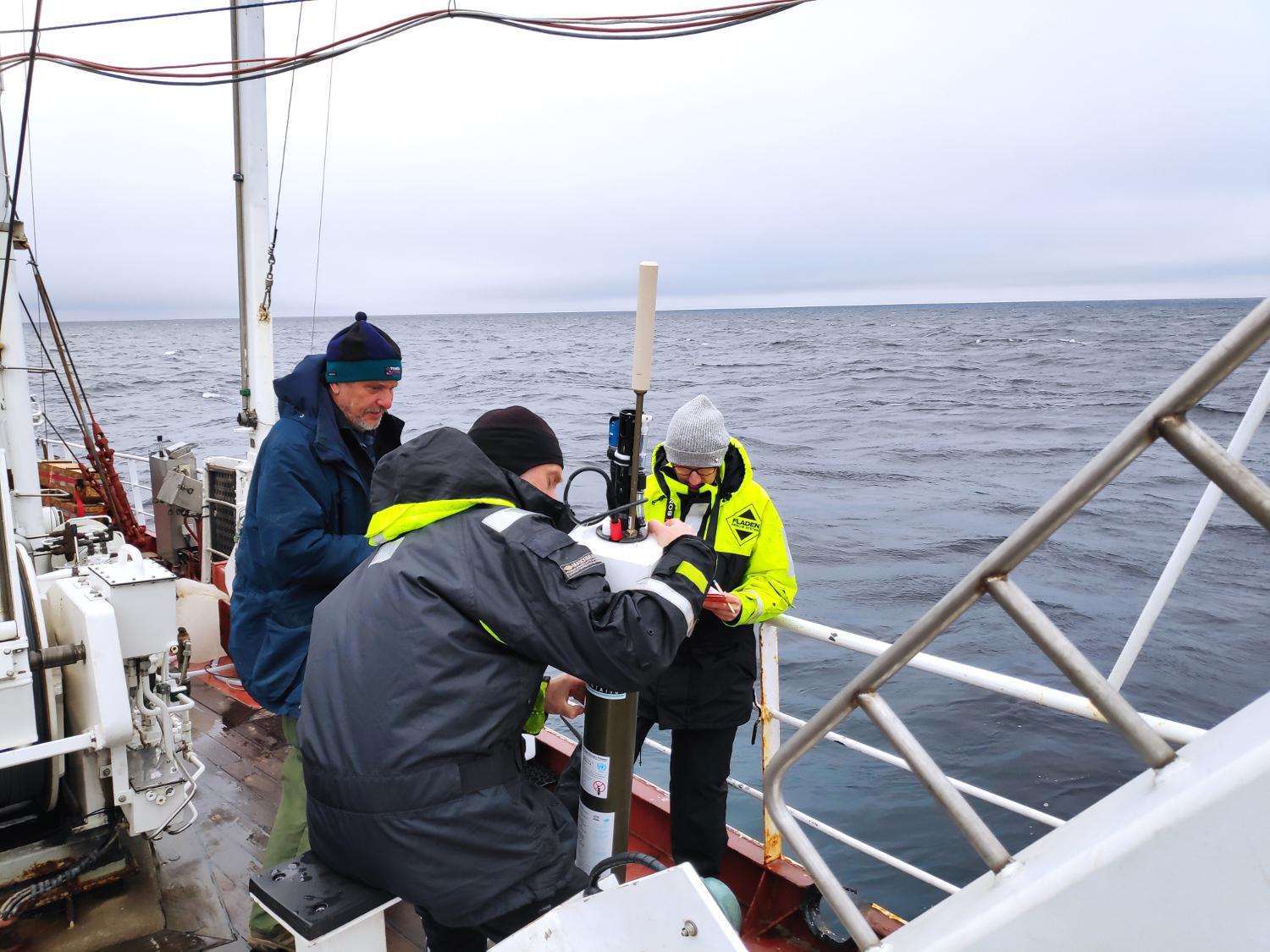
Fig. 4. Preparation for deploying an Argo float aboard r/v Oceania. Photo by Przemysław Makuch
Alongside Finland, Poland is a pioneer in Argo deployments in the Baltic Sea and aims to establish a permanent monitoring network using floats. The regions where the floats are deployed play a significant role in the activities of Argo-Poland. The Arctic region is still poorly covered by oceanographic measurements, and the Baltic Sea was not initially considered in the early stages of the global Argo system. However, IOPAN's experience has shown that despite its small size and shallow depth, the Baltic Sea is well-suited for implementing Argo. In the Baltic Sea, profiling occurs from the surface to the seabed with frequencies ranging from 8 to 48 hours. Unlike the open ocean, the small size of the Baltic Sea allows for the recovery of floats (Fig. 5), calibration of sensors, battery replacement, and reuse. Since 2016, a substantial database covering the southern Baltic Sea has been gathered, with over 3,300 temperature and salinity profiles (CTD) (Fig. 6). Most profiles also include data on dissolved oxygen content. These data are available to all interested parties.

Fig. 5. Argo float recovered in the Gotland Basin during the cruise of s/y Magnus Zaremba in February 2020. Photo by Jaromir Jakacki.
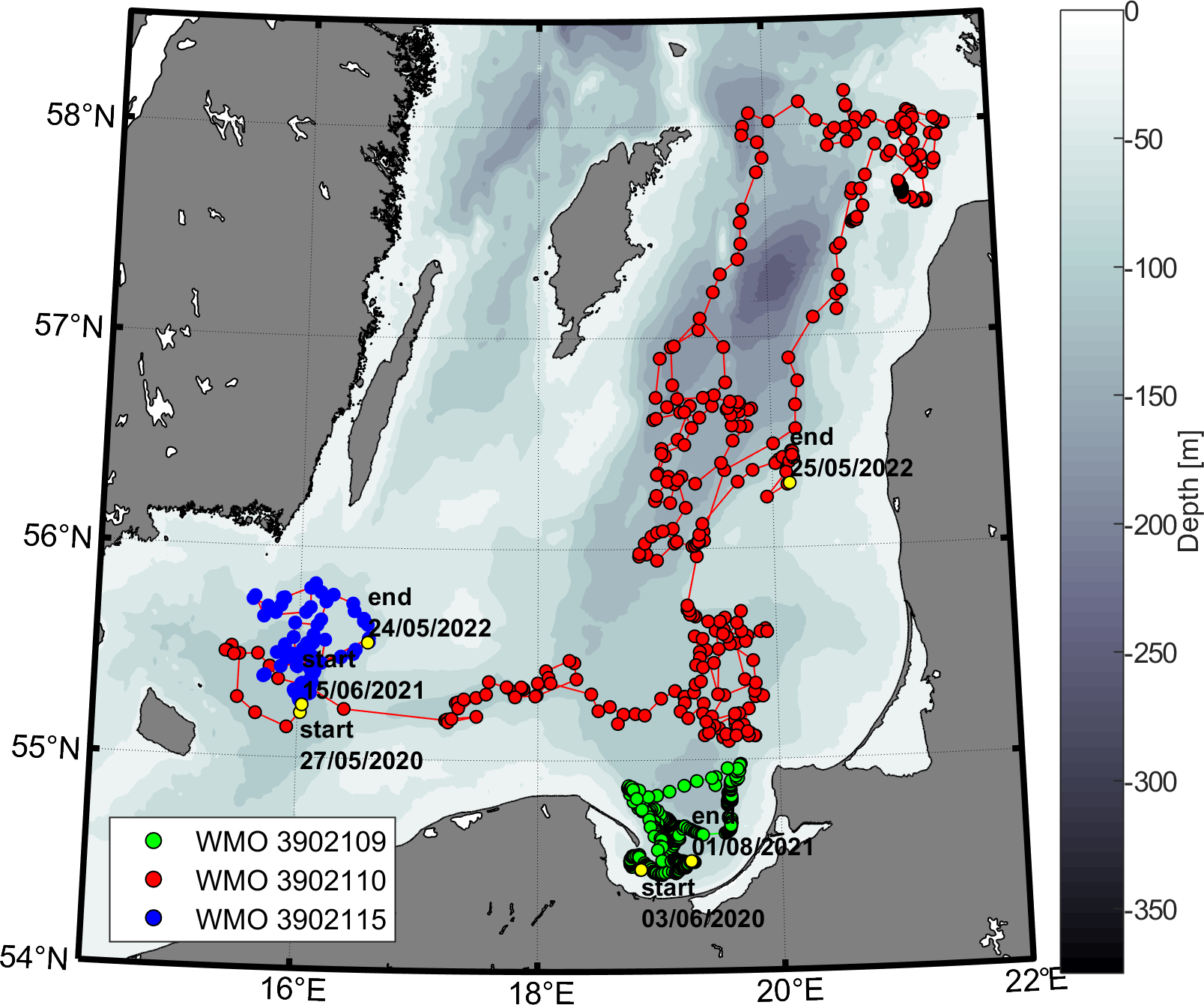
Fig. 6. Example drift trajectories and measurement locations of three Baltic Argo floats. Source: Own materials.
Key conclusions resulting from our previous activities:
- The importance of autonomous devices in oceanographic measurements is increasing.
- Argo floats are reliable and cost-effective sources of real-time oceanographic data.
- The Argo oceanic network is well-organized and maintained.
- Argo data is available on the Coriolis platform.
- Poland is an important participant in the Argo infrastructure.
- Argo floats can be utilized within a comprehensive Baltic Sea monitoring system.
- Various data sources, such as floats, research cruises, and moored instruments, can provide extensive and complementary data for improved monitoring of the Baltic Sea, refinement of numerical models, and validation of satellite observations. • A minimum of seven continuously operating floats should be sufficient for basic monitoring of the deep waters of the Baltic Sea. • Unlike the deep ocean, the small size of the Baltic Sea makes the recovery of floats cost-effective, especially for expensive Biogeochemical floats (BGC). • In the near future, the number and importance of BGC floats will increase, in addition to the standard CTD floats.
For more information about Argo-Poland, please visit the website: https://old.iopan.pl/hydrodynamics/po/Argo/argo_pl.html
Prof. Waldemar Walczowski,
Institute of Oceanology, Polish Academy of Sciences
The publication was created as part of a project funded by the Ministry of Education and Science under agreement No. 2022/WK/04.


